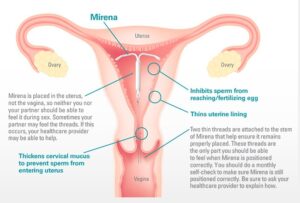Birth control is used by millions of women and not just for preventing pregnancy. It’s part of their routine healthcare plan to regulate their hormones to prevent pregnancy, alleviate heavy bleeding and painful cramping during their menstrual cycle, or alleviate side effects associated with PMS.
Some birth control medication and devices have caused an abnormal number of debilitating side effects. Lawsuits have paid out over one billion dollars in settlements to victims that have used defective birth control treatments and the number isn’t going down anytime soon.
Most recently Bayer, the company best known for distributing aspirin, has come under fire for their birth control device Mirena and its link to pseudotumor cerebri (PTC). Walton Telken is now accepting clients who believe they have suffered neurological and/or severe vision side effects by using Mirena.

What is Mirena?
Mirena is Bayer’s brand of intrauterine device or IUD. The IUD is a t-shaped piece of plastic inserted into the uterus and releases the hormone levonorgestrel. Mirena can be used up to five years or can be removed at any time after placement.
What is Pseudotumor Cerebri?
Pseudotumor Cerebri, or PTC, is a medical condition where there is a sudden increase in pressure on the skull. Often times the cause is a buildup of cerebrospinal fluid, in which case the pressure is called idiopathic intracranial hypertension or IIH.
The name is derived from the feeling of a brain tumor caused by PTC. PTC puts pressure on all the nerves around the brain, which can lead to more serious damage in someone’s sight and hearing.
Side effects of PTC
Headache
Neck pain
Distorted vision
Buzzing sound in ears
Dizziness
Nausea
How are Mirena and PTC connected?
The key lies in the hormone released by Mirena: levonorgestrel. Levonorgestrel is a second generation synthetic hormone, meaning it’s a manmade hormone based off another one naturally found in the body — progesterone in this case.
While Progesterone has actually been shown to help the brain heal after traumatic brain injuries, Levonorgestrel has been shown to do the opposite. Prolonged exposure to levonorgestrel has been shown to increase the risk of intracranial hypertension, which would explain why so many users of Mirena have reported experiencing serious neurological and visual side effects.
The most damning evidence came in April 2017 when journal Neuro-Ophthalmology published a study which concluded Mirena users are seven times more likely to develop PTC than a control user. With evidence that compelling, it’s become clear Mirena does put its users at serious risk of neurological damage.
Can I file a Mirena lawsuit?
Going back to 2009, the FDA has issued multiple warnings alleging Bayer had used misleading information in their advertising of Mirena. Mirena always had warnings on their label for “a migraine, focal migraine with asymmetrical visual loss or other symptoms indicating transient cerebral ischemia,” but nothing for IIH or PTC. Transient cerebral ischemia refers to blood clots in the brain but has nothing to do with outside pressure affecting the brain like PTC of IIH.
If you or a loved one used Mirena and have experienced any of the aforementioned symptoms, Walton Telken is ready to investigate your case. Call 618-307-9880 now for a free consultation today.










